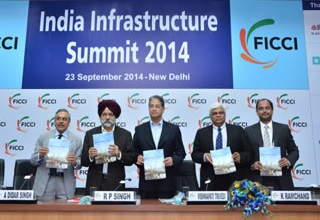NHAI chief calls for a rational tolling policy
Updated: Sep 24, 2014 12:59:57pm

Addressing the India Infrastructure Summit 2014, Singh emphasized the need for a rational tolling policy so that the user is not charged arbitrarily, especially where the charge is disproportionately higher in relation to the distance actually travelled.
The Summit with the theme ‘Transport sector: Convergence and Connectivity’ was organized by the Federation of Indian Chambers of Commerce and Industry (FICCI) on Tuesday.
Business sessions during the summit deliberated on strengthening transport connectivity through convergence; infrastructure fund challenge; and India’s infrastructure performance: Taking it to a higher trajectory.
Singh attributed the perceived failure of PPP projects for growing infrastructure projects to the failure of the people who cover such projects rather than the concept.
“The infrastructure situation in the country is dismal; the pace of investment is sub-optimal and unless we come out of the subsidy regime and inject substantially more funds into capital expenditure for asset creation, the situation will not look up,” he said.
Seeking full transparency in PPP projects, the chairman said much of the problem on PPP projects was caused by aggressive bidding for projects misguided as the developers are by professionals and there is tendency to pass on the risk to the government when the project becomes unviable.
He said a major problem was with interpretation of the Model Concession Agreement (MCA). The bureaucracy has the tendency to look for government-centric interpretation of the clauses in the MCA to the detriment of the private sector.
Citing the problem in selection of PPP, Singh said no study has ever been performed, not even by the Planning Commission, on the optimal road grid required. Basic decisions on these aspects are not taken with care and the tendency is to go on declaring roads as national highways, he said.
With regard to the interpretation of the MCA document, he said, in the port sector also some projects have gone awry because of the interest of developers wanting the projects in a certain way.
There were cases in dispute resolution where the arbitrators have completely reversed the revenue-sharing document against the interests of the developers, he added.
During the event, a Knowledge Paper by FICCI and EY on ‘India’s Transport Sector: Convergence and Connectivity’ was released.
The paper suggests that to avoid long delays relating to project related clearances, single window clearances for all the critical transport projects is required (subject to a project cost threshold).
It said there is a need to develop long-term source of funding through pension and insurance funds and support it with secondary bond market to access long term capital for transport projects.
In order to weed out sub-standard bidders, there is a need to promote quality based selection over least a cost based selection, it said.
The paper emphasized the need to agree base case financial model to build consensus amongst concessionaire, lender and project proponent at the time of financial closure and regularly update it for future renegotiation.
It suggested developing a strategic roadmap for all the future development of ports (major or non-major) in the country in an organised manner.
The paper said railways need to rebuild investor's confidence by developing clear and implementable PPP policy. (KNN/ST)












